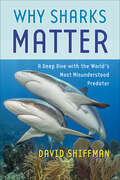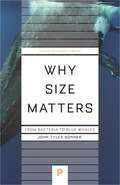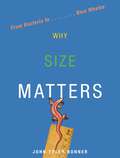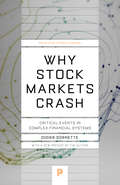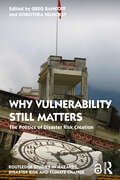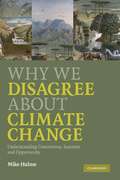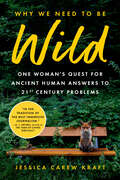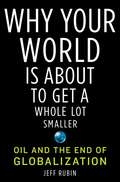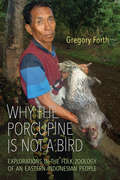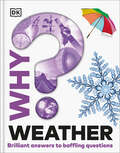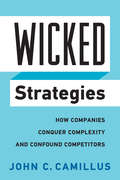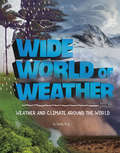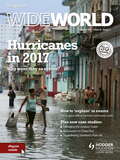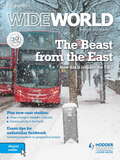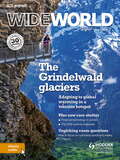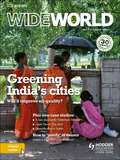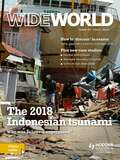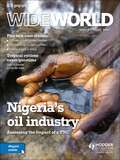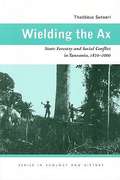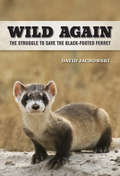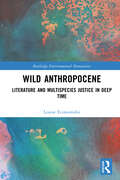- Table View
- List View
Why Sharks Matter: A Deep Dive with the World's Most Misunderstood Predator
by David ShiffmanGet submerged in the amazing world of sharks! Your expert host, award-winning marine biologist Dr. David Shiffman, will show you how—and why—we should protect these mysterious, misunderstood guardians of the ocean.Sharks are some of the most fascinating, most ecologically important, most threatened, and most misunderstood animals on Earth. More often feared than revered, their role as predators of the deep have earned them a reputation as a major threat to humans. But the truth is that sharks are not a danger to us—they're in danger from us.In Why Sharks Matter, marine conservation biologist Dr. David Shiffman explains why it's crucial that we overcome our misconceptions and rise above cinematic jump scares to embrace sharks as the imperiled and elegant ocean guardians they really are. Sharing his own fascinating experiences working with sharks, Shiffman tells us• why healthy shark populations are a must for supporting ocean ecosystems—and the coastal economies that depend on them • why we're in danger of losing many shark species forever• what scientists, conservationists, and readers can do to help save these iconic predators• why so much of what you've heard about sharks and how to save them is wrong Exploring the core tenets of shark conservation science and policy, Shiffman synthesizes decades of scientific research and policymaking, weaving it into a narrative full of humor and adventure. Touching on everything from Shark Week to shark fin soup, overfishing to marine sanctuaries, Shiffman reveals why sharks are in trouble, why we should care, and how we can save them. Perfect for shark enthusiasts, Why Sharks Matter is an approachable, informative guide to the world of shark conservation and the passionate, fascinating, brilliant people who work to understand and protect our oceans. This fun read will have you looking at sharks with a fresh perspective and an understanding that the survival of sharks is crucial to the survival of another apex predator—ourselves.
Why Shouldn't I Eat Junk Food?
by Adam Larkum Kate Knighton Nancy LeschnikoffThis is an informative guide to two of the hottest debates surrounding children today: Junk food and healthy eating. Written in a conversational style, this book offers children an approachable source of information on key subjects such as food labelling, the effects of eating too much junk food, the importance of a varied diet and how food is grown. It is accompanied by the witty and vibrant illustrations of Adam Larkum. It is written in conjunction with child nutrition experts.
Why Size Matters: From Bacteria to Blue Whales (Princeton Science Library #142)
by John Tyler BonnerJohn Tyler Bonner, one of our most distinguished and creative biologists, here offers a completely new perspective on the role of size in biology. In his hallmark friendly style, he explores the universal impact of being the right size. By examining stories ranging from Alice in Wonderland to Gulliver's Travels, he shows that humans have always been fascinated by things big and small. Why then does size always reside on the fringes of science and never on the center stage? Why do biologists and others ponder size only when studying something else—running speed, life span, or metabolism?Why Size Matters, a pioneering book of big ideas in a compact size, gives size its due by presenting a profound yet lucid overview of what we know about its role in the living world. Bonner argues that size really does matter—that it is the supreme and universal determinant of what any organism can be and do. For example, because tiny creatures are subject primarily to forces of cohesion and larger beasts to gravity, a fly can easily walk up a wall, something we humans cannot even begin to imagine doing.Bonner introduces us to size through the giants and dwarfs of human, animal, and plant history and then explores questions including the physics of size as it affects biology, the evolution of size over geological time, and the role of size in the function and longevity of living things.As this elegantly written book shows, size affects life in its every aspect. It is a universal frame from which nothing escapes.
Why Size Matters: From Bacteria to Blue Whales (Princeton Science Library #142)
by John Tyler BonnerWhy size plays such a big role in the living worldJohn Tyler Bonner, one of our most distinguished and creative biologists, here offers a completely new perspective on the role of size in biology. In his hallmark friendly style, he explores the universal impact of being the right size. By examining stories ranging from Alice in Wonderland to Gulliver's Travels, he shows that humans have always been fascinated by things big and small. Why then does size always reside on the fringes of science and never on the center stage? Why do biologists and others ponder size only when studying something else--running speed, life span, or metabolism?Why Size Matters, a pioneering book of big ideas in a compact size, gives size its due by presenting a profound yet lucid overview of what we know about its role in the living world. Bonner argues that size really does matter--that it is the supreme and universal determinant of what any organism can be and do. For example, because tiny creatures are subject primarily to forces of cohesion and larger beasts to gravity, a fly can easily walk up a wall, something we humans cannot even begin to imagine doing.Bonner introduces us to size through the giants and dwarfs of human, animal, and plant history and then explores questions including the physics of size as it affects biology, the evolution of size over geological time, and the role of size in the function and longevity of living things.As this elegantly written book shows, size affects life in its every aspect. It is a universal frame from which nothing escapes.
Why Stock Markets Crash: Critical Events in Complex Financial Systems
by Didier SornetteThe scientific study of complex systems has transformed a wide range of disciplines in recent years, enabling researchers in both the natural and social sciences to model and predict phenomena as diverse as earthquakes, global warming, demographic patterns, financial crises, and the failure of materials. In this book, Didier Sornette boldly applies his varied experience in these areas to propose a simple, powerful, and general theory of how, why, and when stock markets crash. Most attempts to explain market failures seek to pinpoint triggering mechanisms that occur hours, days, or weeks before the collapse. Sornette proposes a radically different view: the underlying cause can be sought months and even years before the abrupt, catastrophic event in the build-up of cooperative speculation, which often translates into an accelerating rise of the market price, otherwise known as a "bubble." Anchoring his sophisticated, step-by-step analysis in leading-edge physical and statistical modeling techniques, he unearths remarkable insights and some predictions--among them, that the "end of the growth era" will occur around 2050. Sornette probes major historical precedents, from the decades-long "tulip mania" in the Netherlands that wilted suddenly in 1637 to the South Sea Bubble that ended with the first huge market crash in England in 1720, to the Great Crash of October 1929 and Black Monday in 1987, to cite just a few. He concludes that most explanations other than cooperative self-organization fail to account for the subtle bubbles by which the markets lay the groundwork for catastrophe. Any investor or investment professional who seeks a genuine understanding of looming financial disasters should read this book. Physicists, geologists, biologists, economists, and others will welcome Why Stock Markets Crash as a highly original "scientific tale," as Sornette aptly puts it, of the exciting and sometimes fearsome--but no longer quite so unfathomable--world of stock markets.
Why Vulnerability Still Matters: The Politics of Disaster Risk Creation (Routledge Studies in Hazards, Disaster Risk and Climate Change)
by Greg Bankoff Dorothea HilhorstWe think vulnerability still matters when considering how people are put at risk from hazards and this book shows why in a series of thematic chapters and case studies written by eminent disaster studies scholars that deal with the politics of disaster risk creation: precarity, conflict, and climate change. The chapters highlight different aspects of vulnerability and disaster risk creation, placing the stress rightly on what causes disasters and explaining the politics of how they are created through a combination of human interference with natural processes, the social production of vulnerability, and the neglect of response capacities. Importantly, too, the book provides a platform for many of those most prominently involved in launching disaster studies as a social discipline to reflect on developments over the past 50 years and to comment on current trends. The interdisciplinary and historical perspective that this book provides will appeal to scholars and practitioners at both the national and international level seeking to study, develop, and support effective social protection strategies to prevent or mitigate the effects of hazards on vulnerable populations. It will also prove an invaluable reference work for students and all those interested in the future safety of the world we live in.
Why Vulnerability Still Matters: The Politics of Disaster Risk Creation (Routledge Studies in Hazards, Disaster Risk and Climate Change)
by Greg Bankoff Dorothea HilhorstWe think vulnerability still matters when considering how people are put at risk from hazards and this book shows why in a series of thematic chapters and case studies written by eminent disaster studies scholars that deal with the politics of disaster risk creation: precarity, conflict, and climate change.The chapters highlight different aspects of vulnerability and disaster risk creation, placing the stress rightly on what causes disasters and explaining the politics of how they are created through a combination of human interference with natural processes, the social production of vulnerability, and the neglect of response capacities. Importantly, too, the book provides a platform for many of those most prominently involved in launching disaster studies as a social discipline to reflect on developments over the past 50 years and to comment on current trends.The interdisciplinary and historical perspective that this book provides will appeal to scholars and practitioners at both the national and international level seeking to study, develop, and support effective social protection strategies to prevent or mitigate the effects of hazards on vulnerable populations. It will also prove an invaluable reference work for students and all those interested in the future safety of the world we live in.
Why We Disagree About Climate Change
by Mike HulmeClimate change is not 'a problem' waiting for 'a solution'. It is an environmental, cultural and political phenomenon which is re-shaping the way we think about ourselves, our societies and humanity's place on Earth. Drawing upon twenty-five years of professional work as an international climate change scientist and public commentator, Mike Hulme provides a unique insider's account of the emergence of this phenomenon and the diverse ways in which it is understood. He uses different standpoints from science, economics, faith, psychology, communication, sociology, politics and development to explain why we disagree about climate change. In this way he shows that climate change, far from being simply an 'issue' or a 'threat', can act as a catalyst to revise our perception of our place in the world. Why We Disagree About Climate Change is an important contribution to the ongoing debate over climate change and its likely impact on our lives.
Why We Disagree about Climate Change: Understanding Controversy, Inaction and Opportunity
by Mike HulmeClimate change is not 'a problem' waiting for 'a solution'. It is an environmental, cultural and political phenomenon which is re-shaping the way we think about ourselves, our societies and humanity's place on Earth. Drawing upon twenty-five years of professional work as an international climate change scientist and public commentator, Mike Hulme provides a unique insider's account of the emergence of this phenomenon and the diverse ways in which it is understood. He uses different standpoints from science, economics, faith, psychology, communication, sociology, politics and development to explain why we disagree about climate change. In this way he shows that climate change, far from being simply an 'issue' or a 'threat', can act as a catalyst to revise our perception of our place in the world. Why We Disagree About Climate Change is an important contribution to the ongoing debate over climate change and its likely impact on our lives.
Why We Need to Be Wild: One Woman's Quest for Ancient Human Answers to 21st Century Problems
by Jessica Carew Kraft"In the tradition of the best immersive journalism." –A.J. Jacobs, author of The Year of Living BiblicallyA bold examination of how Paleolithic wisdom could solve our 21st century problemsJessica Carew Kraft, an urban wife and mom of two, was firmly rooted in the modern world, complete with a high-powered career in tech and the sneaking suspicion that her lifestyle was preventing her and her family from truly thriving. Determined to find a better way, Jessica quit her job and set out to learn about "rewilding" from people who reject the comforts and convenience of civilization by using ancient tools and skills to survive. Along the way, she learned how to turn sticks into fire, stones into axes, and bones into tools for harvesting wild food—and found an entire community walking the path back from our technology-focused, anxiety-ridden way of life to a simpler, more human experience.Weaving deep research and reportage with her own personal journey, Jessica tells the remarkable story of the potential benefits rewilding has for us and our planet, and questions what it truly means to be a human in today's world. For readers of A Hunter-Gatherer's Guide to the 21st Century and Hunt, Gather, Parent, Why We Need to Be Wild is a thought-provoking, unforgettable narrative that illuminates how we survived in the past, how we live now, and how each of us can choose to thrive in the years ahead. "Kraft shows us how we could all benefit from being a little less civilized." —Tiffany Shlain, author of 24/6: The Power of Unplugging One Day a Week
Why Your World Is About To Get A Whole Lot Smaller: Oil and the End of Globalization
by Jeff RubinWhat do subprime mortgages, Atlantic salmon dinners, SUVs and globalization have in common? They all depend on cheap oil. And in a world of dwindling oil supplies and steadily mounting demand around the world, there is no such thing as cheap oil. Oil might be less expensive in the middle of a recession, but it will never be cheap again. Take away cheap oil, and the global economy is getting the shock of its life. From the ageing oilfields of Saudi Arabia and the United States to the Canadian tar sands, from the shopping malls of Dubai to the shuttered auto plants of North America and Europe, from the made-in-China products on the shelves of the Wal-Mart down the road to the collapse of Wall Street giants, everything is connected to the price of oil Interest rates, carbon trading, inflation, farmers’ markets and the wave of trade protectionism washing up all over the world in the wake of various economic stimulus and bailout packages – they all hinge on the new realities of a world where demand for oil eventually outstrips supply. According to maverick economist Jeff Rubin, there will be no energy bailout. The global economy has suffered oil crises in the past, but this time around the rules have changed. And that means the future is not going to be a continuation of the past. For generations we have built wealth by burning more and more oil. Our cars, our homes, our whole world has been getting bigger in the cheap-oil era. Now it is about to get smaller. There will be winners as well as losers as the age of globalization comes to an end. The auto industry will never recover from this oil-induced recession, but other manufacturers will be opening up mothballed factories. Distance will soon cost money, and so will burning carbon – both will bring long-lost jobs back home. We may not see the kind of economic growth that globalization has brought, but local economies will be revitalized, as will our cities and neighborhoods. Whether we like it or not, our world is about to get a whole lot smaller. From the Hardcover edition.
Why the Porcupine is Not a Bird: Explorations in the Folk Zoology of an Eastern Indonesian People
by Gregory ForthWhy the Porcupine Is Not a Bird is a comprehensive analysis of knowledge of animals among the Nage people of central Flores in Indonesia. Gregory Forth sheds light on the ongoing anthropological debate surrounding the categorization of animals in small-scale non-Western societies.Forth's detailed discussion of how the Nage people conceptualize their relationship to the animal world covers the naming and classification of animals, their symbolic and practical use, and the ecology of central Flores and its change over the years. His study reveals the empirical basis of Nage classifications, which align surprisingly well with the taxonomies of modern biologists. It also shows how the Nage employ systems of symbolic and utilitarian classification distinct from their general taxonomy. A tremendous source of ethnographic detail, Why the Porcupine Is Not a Bird is an important contribution to the fields of ethnobiology and cognitive anthropology.
Why? Weather: Brilliant Answers to Baffling Questions (Why? Series)
by DKExplore the intriguing answers to more than 200 questions about weather and learn all about the real-time impacts of the climate crisis in this absorbing encyclopedia for kids.What happens inside a thundercloud? Why is the sky not always blue? How are hurricanes born? Why is climate change dangerous? This children's book helps inquisitive minds find out answers to all the questions they may have about weather and climate, and some they hadn't thought of! Featuring detailed explanations to weather wonders, extreme weather, the science of weather forecasting, and climate change, Why? Weather helps children become weather experts in no time. Each page asks and answers a different question, and features a quick quiz designed to cement new knowledge. Bursting with mind-boggling facts, stunning photography, and extensive diagrams, this visually appealing book will be treasured by every budding meteorologist.
Wicked Strategies: How Companies Conquer Complexity and Confound Competitors
by John C. CamillusIn business, some problems are so complex, intractable and threatening to organizations--or entire industries--that they are best described as "wicked." These problems appear to be unsolvable and they render traditional analytical tools of strategy virtually impotent.Wicked Strategies offers a comprehensive framework for identifying, responding to and profiting from wicked problems. John C. Camillus, drawing on detailed, real-life examples from companies across the globe, has skillfully woven together the analytical techniques, processes and organizational designs that will enable managers to navigate a disruptive marketplace. His feed-forward framework for fashioning wicked strategies empowers firms to presciently transform their business models before they are made obsolete by the competition. Wicked Strategies is a practical and evocative guide that demonstrates how business leaders can profitably capitalize on unknowable futures.
Wide World of Weather: Weather and Climate Around the World (Weather and Climate)
by Emily RaijFrom windswept deserts to rain-soaked forests, the world's climates experience weather unique to their place in the world. Discover how scientists study climates, the weather experienced in each one, and how climate impacts the people who live there.
Wideworld Magazine Volume 30, 2018/19 Issue 1
by Hodder Education MagazinesThis GCSE geography magazine provides up-to-date case studies, exam advice, and support with geographical skills, to help students get their best grade. Wideworld also aims to develop students' revision and exam skills, write stronger essays and improve their grades.ContentsCase study Costa Rica's eco-tourism Jane Ferretti Improve your grade Understanding the command word 'explain' Bob Digby, GCSE examiner Case study The regeneration of Park Hill flats, Sheffield Jack Thompson The dirty truth about our rivers Landscapes pictured East London Geographical skills Exploring population pyramids Michelle Minton, Leeds West Academy, Leeds Geography online Comparing maps and photographs Andrew Day Case study The Jurassic Coast Steph Buckland Changing places The north Atlantic hurricane season of 2017 Lucy Clarke
Wideworld Magazine Volume 30, 2018/19 Issue 2
by Hodder Education MagazinesContentsCase studyThe storm of March 2018: understanding 'the Beast from the East'Michelle Minton, Leeds West Academy, LeedsImprove your gradeAnswering exam questions on unfamiliar fieldworkBob Digby, GCSE examinerCase studyUrban change in Medellin, ColombiaJane FerrettiLandscapes picturedThe FenlandsGeography onlineInteractive map makingAndrew DayGeographical skillsProportional symbolsMichelle Minton, Leeds West Academy, LeedsCase studyMurlough sand dunes: a small-scale UK ecosystemLucy ClarkeChanging placesKilauea and Fuego volcanoesChanging placesThe Kilauea and Fuego eruptions
Wideworld Magazine Volume 30, 2018/19 Issue 3
by Hodder Education MagazinesContentsCase studyGlacial retreat and tourism in Grindelwald, SwitzerlandStephanie Denning, Coventry UniversityGeography onlineUK international trade links: how does the UK pay its way in a globalising world?Andrew DayCase studyFinancial technology in LondonMichael Stevens, Alleyn's School, LondonGeographical skillsPerforming a risk assessmentMichelle Minton, Leeds West Academy, LeedsLandscapes picturedDover Castle and ferry portDown my wayLondon's east-west cycle superhighwayDominic Stokes, City of London SchoolImprove your gradeUnpicking exam questionsBob Digby, GCSE examinerCase studyThe 2018 summer heatwaveMichelle Minton, Leeds West Academy, LeedsChanging placesAlaska: a cold environmentJack Thompson, The Dearne ALC, DoncasterChanging placesAlaska
Wideworld Magazine Volume 30, 2018/19 Issue 4
by Hodder Education MagazinesCase StudyCape Town's Water Crisis: from zero to hero?Improve your gradeUnderstanding the command word 'justify'Case StudyGreening India's cities: a sustainable solution?Geography onlineDrowning in plastic: global waste and the world's oceansLandscapes picturedPeak District National ParkGeographical skillsReading OS mapsDown my wayThe Scalpel: a new era of high riseCase studyInequality in London: Spurs' new stadiumChanging placesDesertification in SudanChanging placesSudan
Wideworld Magazine Volume 31, 2019/20 Issue 1
by Hodder Education MagazinesContentsCase studyRainwater harvesting in UgandaJosh Rogers, Lynn Grove Academy, Great YarmouthGeography onlineMapping ocean tsunamisAndrew DayCase studyBlades on the Humber: Siemens wind turbinesBrian GreasleyImprove your gradeUnderstanding the command word 'discuss'Bob Digby, GCSE examinerLandscapes picturedPortreath, CornwallGeographical skillsInterpreting weather mapsCase studyThe 2018 Indonesian tsunami: causes, impacts and responsesLucy ClarkeCase studyThe changing UK high streetMalcolm RenwickChanging placesWater transfer schemesElizabeth HudsonChanging placesUK water transfer schemes
Wideworld Magazine Volume 31, 2019/20 Issue 2
by Hodder Education MagazinesContentsCase studyNigeria's oil industryElizabeth HudsonImprove your gradeWriting case study answers about tropical cyclonesBob Digby, GCSE examinerCase studyA cleaner, greener HarrogateBrian GreasleyGeography onlinePopulation highs and lowsAndrew DayLandscapes picturedHigh Force, County DurhamGeographical skillsDrawing geographical diagramsMichelle Minton, Leeds West Academy, LeedsCase studyClimate change in New ZealandJane FerrettiCase studyEconomic and social change in Peckham, south LondonAlice Mollison, James Allen's Girls' School, LondonChanging placesPower for MozambiqueJo Outram and Malcolm RenwickChanging placesImprovements brought by electricity access
Wielding the Ax: State Forestry and Social Conflict in Tanzania, 1820-2000 (Ecology and History)
by Thaddeus Sunseri<p>Forests have been at the fault lines of contact between African peasant communities in the Tanzanian coastal hinterland and outsiders for almost two centuries. In recent decades, a global call for biodiversity preservation has been the main challenge to Tanzanians and their forests. <p>Thaddeus Sunseri uses the lens of forest history to explore some of the most profound transformations in Tanzania from the nineteenth century to the present. He explores anticolonial rebellions, the world wars, the depression, the Cold War, oil shocks, and nationalism through their intersections with and impacts on Tanzania’s coastal forests and woodlands. In Wielding the Ax, forest history becomes a microcosm of the origins, nature, and demise of colonial rule in East Africa and of the first fitful decades of independence. <p>Wielding the Ax is a story of changing constellations of power over forests, beginning with African chiefs and forest spirits, both known as “ax–wielders,” and ending with international conservation experts who wield scientific knowledge as a means to controlling forest access. The modern international concern over tropical deforestation cannot be understood without an awareness of the long–term history of these forest struggles.</p>
Wild Again
by David S. JachowskiThis engaging personal account of one of America's most contested wildlife conservation campaigns has as its central character the black-footed ferret. Once feared extinct, and still one of North America's rarest mammals, the black-footed ferret exemplifies the ecological, social, and political challenges of conservation in the West, including the risks involved with intensive captive breeding and reintroduction to natural habitat. David Jachowski draws on more than a decade of experience working to save the ferret. His unique perspective and informative anecdotes reveal the scientific and human aspects of conservation as well as the immense dedication required to protect a species on the edge of extinction. By telling one story of conservation biology in practice--its routine work, triumphs, challenges, and inevitable conflicts--this book gives readers a greater understanding of the conservation ethic that emerged on the Great Plains as part of one of the most remarkable recovery efforts in the history of the Endangered Species Act.
Wild Anthropocene: Literature and Multispecies Justice in Deep Time (Routledge Environmental Humanities)
by Louise EconomidesWild Anthropocene examines four key areas—the politics of deep time, neoliberalism's socio-ecological impacts, global population growth and inter-species entanglement—to demonstrate how literature illuminates progressive solutions to Anthropocene challenges. The book argues that technological mitigation of contemporary environmental crises must be complimented by a politics committed to multispecies justice. Central to this new politics is the project of reimagining our relationship with time as something other than its status within capitalist praxis.The book brings together poetry and fiction written by a diverse range of writers to demonstrate how contemporary literature addresses important connections between social oppression and environmental issues. It also critiques techno-managerial visions of the future that celebrate humanity's ever-growing "control" over ecosystems by examining multiple sources of wildness (temporal, environmental and technological) that expose the problematic ideology underwriting such aspirations. Readers will be introduced to a way of understanding the Anthropocene that, while being informed by recent discoveries in earth science and evolutionary biology, also makes a strong case for humanities-based understanding of environmental politics.This interdisciplinary text will be a useful addition to theoretical discussions on the Anthropocene for scholars, researchers and students in the environmental humanities, literary studies, ecocriticism and environmental philosophy.
